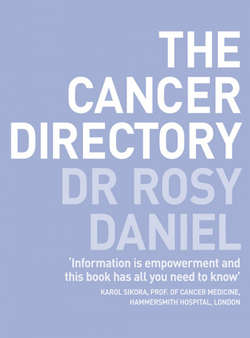Читать книгу The Cancer Directory - Dr. Daniel Rosy - Страница 97
Discussing complementary and alternative options
ОглавлениеWhile your doctor may be happy to discuss various orthodox treatments, a frequently different reaction may appear when you bring up the subject of integrating alternative treatments with what he has to offer.
Ideally, your doctor will be receptive and open to what you want to consider. If he has no knowledge of a particular treatment or approach, he should welcome any information you can supply him and study it. He can then consider whether there are any contraindications to using it alongside orthodox treatments, and he can engage in an informed discussion with you about formulating a treatment plan which best meets all of your needs.
However, this scenario is not typical of what happens to the majority of people who try to discuss integrating their cancer treatments with their doctors. You may encounter a number of reactions, ranging from dismissal to an outright declaration that what you are considering is rubbish and a waste of money. So, you need to be prepared with the right attitude to achieve the best possible working relationship on this matter.
Attend the appointment armed with as much information and research evidence about the treatments you are considering as possible. If your doctor dismisses the treatments out of hand, ask him:
• How much does he actually know about the treatment?
• On what evidence is he basing his opinion?
If your doctor has little knowledge of the treatment, offer him the information so that he can give you an informed opinion. If he offers you a sound reason why he considers your proposed treatments unsuitable for you, or has reason to doubt the reliability of the treatment or practitioner, that may be information you need to know. If, however, your doctor displays pure prejudice, then you have to consider whether this particular doctor is going to be the best person for you to work with.
The words ‘working with’ are key here. If you feel you are unlikely to develop a partnership with your doctor without feeling compromised, then you might want to think about changing to a team that will better fit your needs. Though this may seem drastic and difficult to consider when feeling under pressure, bear in mind how important it is that, in the long term, you are involved in your own decision-making process, that your opinion is listened to and that you are ‘choosing your treatment’, not being ‘given it’.
In summary, when diagnosed with cancer and evaluating treatment options:
• Get the facts about your illness
• Make a list of questions you want answered (see Chapter 3)
• Ask to see the consultant (rather than the juniors) responsible for your care
• Do not be afraid to ask anything, but let your team know how much you want to know
• Insist on being told the truth
• Make sure you know what alternative and complementary approaches are available
• Take a relative or close friend with you to make notes (or take a cassette recorder, although this might be intimidating for medical staff and often means that their answers will be far more guarded)
• Discuss any queries with your GP
• If you are not happy about any aspect of your care, tell your doctors or the cancer services manager of the unit where you are being treated
• Talk to nurses, radiographers and pharmacists, who are often useful sources of information and have more time to explain things that you may not have understood in the short time spent with the doctor
• If you are unsure about what to do, ask to see the consultant again or seek a second or third opinion
• Take steps to prepare and support yourself and your immune system throughout your treatment programme (see Chapter 7).
